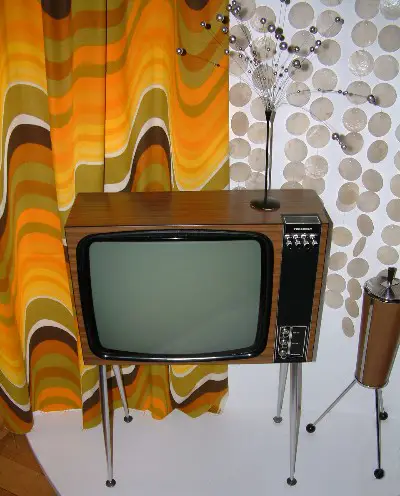Television in the 60s

Television became a universal habit in the 60s. Cinemas were closing in large numbers and there was good reason to believe that the small screen would destroy the cinema entirely. By 1960, nearly three quarters of the population had television, and by the end of the sixties, nearly ninety-five percent.
Britain only had two channels in 1960, BBC and IIV. A third channel BBC2 arrived in 1964. It was broadcast on 625 lines UHF, older sets could only receive 405 lines. BBC1 and ITV were still broadcast on the old band. In the mid sixties sets were sold that could receive both. The public were less keen on BBC2. Programmes were more high-brow. Consequently, take-up was slower than had been for ITV in 1955.
By the mid sixties, viewing habits had not changed significantly except for "Top of the Pops". The top five BBC programmes for that year were:
- 1. Dr Finlay's Casebook (9.15pm Sunday)
- 2. Black and White Minstrel Show (7.50pm Saturday)
- 3. Top of the Pops (7.30 pm Thursday)
- 4. Perry Mason (9.25pm Monday)
- 5. Z Cars (8.00pm Wednesday)
-
This is a typical Saturday's viewing from 1965 (24 July)
BBC15.15 Juke Box Jury5.40 Dr Who: Checkmate 6.05 News, weather 6.15 Cricket 6.35 The 1965 Royal Tournament 7.20 Western 8.50 Summer Comedy Hour 9.55 The Flying Swan 10.40 News 10.50 The Andy Williams Show 11.40 Weather BBC26.55 News7.00 Sport of the Day 7.50 Montreux Festival 1965 8.20 The Big Stride 8.45 Legend of Death 9.10 Cinema 625 10.40 News Summary 10.42 Late Night Line-up |
Midland ITV (ABC)1.10 Summer Sport (Water skiing, racing, athletics,motor-racing, wrestling) 5.5 Sports Round-up 5.15 Sir Francis Drake 5.45 News from ITN 5.50 Lucky Stars - Summer Spin 6.30 Opportunity Knocks 7.20 Hong Kong 8.15 The Best of Morcambe and Wise 8.50 Hawaiian Eye 9.40 News 9.50 Ghost Squad 10.45 Mainly Millicent 11.20 ABC Weekend, weather, Epilogue Close Down London ITV offered the same schedule except: 5.15 - 5.45 The Forest Rangers 7.20 The Saint 8.15 The Great Van Robbery 9.20 The Best of Morecambe and Wise 10.00 News 10.10 Undermind: Onset of Fear 11.5 Milligan's Wake 11.35 Four Just Men, weather, Epilogue. |
Yes that's right television on BBC1 started at 5.15pm - although in
other months "Grandstand" would have been shown on Saturday afternoon.
The "Western" on BBC1 was "Flame of the Barbary Coast" staring John Wayne and Ann Dvorak. "The Great Van Robbery" was a film about a daring robbery of a Royal Mint van. BBC2's "Cinema 625" was a Czech film called "Transport from Paradise" about concentration camps.
The "Summer Comedy Hour" BBC1 (8.50pm) was a play "Almost a honeymoon", by Walter Ellis. It made it's debut in the West End in 1930. In 1965, a play written in 1930 would have been considered old fashioned, rather than nostalgic. ITV's offering "Undermind" was a thriller about a sinister organisation that was trying to disrupt Western Society. This kind of theme was fairly common in sixties film and TV. At 7.20 on ITV London you could see "The Saint" staring Roger Moore.
Man walks on the Moon - in colour
Colour television was first broadcast at the end of 1967. In this era colour television sets were very expensive and take-up was slow. Originally colour could only be received on BBC2 - ITV and BBC1 were first shown in colour in 1969. In 1969, BBC2 viewers were able to see shots from the Moon in colour. The Moon landing itself was broadcast at 3.56am on a programme hosted by Cliff Michelmore, James Burke and Patrick Moore. Coverage had begun at 11.30pm the previous night and continued throughout the night - a real rarity in this era.
In 1969 the BBC was busy converting existing programmes to colour - "The Troubleshooters", "The Doctors", "Z cars" and "Softly, Softly" all went out in colour that year.
Read more:
Detective dramas on UK TV in the 1960s
Article by Steven Braggs, 2006


Comments
thanks, great info however on the first bit it says IIV instead f ITV and thats really annoying LOL